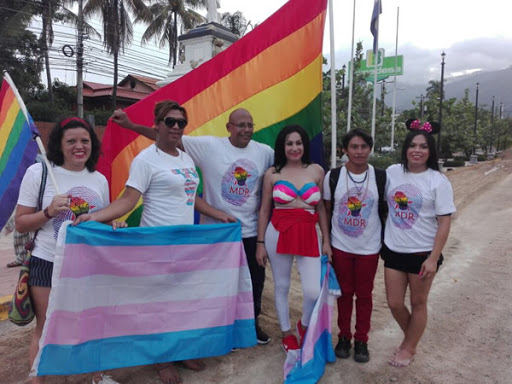A State Department spokesperson says the U.S. will continue to urge the governments of Guatemala, El Salvador and Honduras to protect LGBTQ rights as part of its efforts to address the “root causes” of migration from the three countries.
“Human rights, including those of LGBTQI+ persons, is one of the central pillars of our engagement with leaders from Guatemala, Honduras and El Salvador,” said the spokesperson in response to a series of written questions from the Washington Blade.
“The United States raises concerns about violence, discrimination, abuse, harassment and stigma targeting LGBTQI+ (people) across northern Central America with various stakeholders,” added the spokesperson. “We work to engage on these issues across multilateral fora, such as the United Nations, the Equal Rights Coalition and the Organization of American States.”
Guatemala, El Salvador and Honduras form what is known as Central America’s Northern Triangle.
Vice President Kamala Harris, who met with Guatemalan President Alejandro Giammattei last month during her trip to Guatemala City, has said on numerous occasions that violence based on sexual orientation and gender identity is one of the factors behind migration from the region. Harris and other administration officials have also told migrants not to travel to the U.S.-Mexico border because it remains closed to them due to the pandemic.
LGBTQ Hondurans with whom the Blade recently spoke acknowledged violence has forced them to flee their homes.
Leonela Barralaga and Jerlín Martel are a same-sex couple who are raising an 11-year-old daughter in La Ceiba, Honduras.
They told the Blade on July 20 during an interview at the offices of Organización Pro Unión Ceibeña, a local human rights group, that they have fled Honduras twice. Barralaga and Martel said they returned to the country once because they did not want their daughter to further endure the squalid conditions in which they were living in Tapachula, Mexico, a city in the country’s Chiapas state that borders Guatemala.
Marvin Obdulio, a gay man from Honduras who plans to ask for asylum in the U.S., currently lives at Jardín de las Mariposas, a shelter for LGBTQ asylum seekers in the Mexican border city of Tijuana.
Obdulio during a July 12 interview with the Blade at Jardín de las Mariposas spoke about his brother, who was murdered earlier this year in Honduras. Obdulio was sobbing when Jaime Marín, who runs the shelter with his mother, Yolanda Rocha, showed this reporter a picture of his brother’s mutilated body in the morgue in San Pedro Sula, Honduras’ second-largest city.
A court in the Salvadoran capital of San Salvador last August sentenced three police officers to 20 years in prison for the 2017 murder of Camila Díaz Córdova, a trans woman who the U.S. deported. The Inter-American Court of Human Rights last month found Honduras responsible for the murder of Vicky Hernández, a trans woman who was killed hours after the 2009 coup that ousted then-President Manuel Zelaya.
Alexa Euceda, a trans woman who receives services at Organización Pro Unión Ceibeña, told the Blade during an emotional interview that she was raped in prison while serving a sentence for a stabbing she claims was an act of self-defense. Eucada also said guards forcibly cut her hair.
The Blade the day before witnessed a man stop his car on a street in San Pedro Sula, which is about three hours west of La Ceiba, and solicit for sex work two trans women with Colectivo Unidad Color Rosa, a local LGBTQ rights group. The U.S. granted asylum to Claudia Spellman, a trans woman who co-founded Colectivo Unidad Color Rosa, after death threats forced her to flee Honduras.
“The United States is committed to fighting for the human rights of LGBTQI+ persons at home and abroad,” the State Department spokesperson told the Blade. “LGBTQI+ persons are among the most vulnerable to forced displacement in and from El Salvador, Guatemala and Honduras.”
“Promoting and advancing these human rights is a foreign policy priority,” added the spokesperson. “As such, we endeavor to combat the violence and abuse, criminalization, discrimination and stigma targeting LGBTQI+ persons around the world, including in these three countries.”
Two members of Guatemalan civil society who work with LGBTQ people and people with HIV/AIDS — Visibles Executive Director Daniel Villatoro and Ingrid Gamboa of the Association of Garifuna Women Living with HIV/AIDS — are among those who participated in a round table with Harris in Guatemala City.
Samantha Power, administrator of the U.S. Agency for International Development, and U.S. Ambassador to Guatemala William Popp on June 17 visited the Guatemala City headquarters of Organización Trans Reina de las Noche, a trans advocacy group. The visit took place less than a week after Andrea González, the organization’s executive director who previously participated in the State Department’s International Visitors Leadership Program, was murdered near her Guatemala City home.
Sasha Rodríguez, a trans woman who works for Organización Pro Unión Ceibeña, is also an IVLP alum.
Bianka Rodríguez, executive director of COMCAVIS TRANS, a trans Salvadoran rights group, is among those who participated in what a USAID spokesperson described to the Blade as a “youth leaders lunch roundtable that we organized” with Power in San Salvador last month. The USAID spokesperson noted “they exchanged important points of view regarding USAID support (past and present) and the challenges of the LGBTIQ+ community in the country.”
“USAID human rights projects based in El Salvador support anti-discrimination efforts against the LGBTQI+ community,” said the State Department spokesperson. “They also support a regional effort that engages private sector companies in inclusive strategies to open labor opportunities for the LGBTQI+ community.”
“Projects also do research on hate crimes against the LGTBQI+ community and provides to the justice sector to investigate such crimes,” they added. “The majority of activities are led by local or regional LGBTQI+ groups.”
The State Department spokesperson noted “discussions between civil society leaders” and the U.S. Embassy in Honduras, “as well as USAID-led forums on LGBTQI+ migration push factors, help us learn more about the root causes and ways we can better support this community.” They also pointed out that USAID’s Unidos por la Justicia project “has supported the LGBTQI+ community to develop an anti-discrimination law and the law of gender identity” in the country.
USAID and Unidos por la Justicia in 2019 officially recognized Unidad Colectivo Color Rosa for its work. The Blade on July 19 saw a plaque with the two organizations’ logos on it hanging inside their San Pedro Sula office.
“USAID in Honduras has done extensive work with the LGBTQI+ population who lack access to formal education and workforce development services by supporting training that included self-esteem and human rights to prevent stigma and discrimination, and promote respect for diversity,” said the State Department spokesperson. “Through private sector engagement, businesses have agreed to interview members of the LGBTQI+ community, which is the foundation to valuing diversity in the workplace.”
USAID also works with Asociación PASMO, an organization that conducts HIV testing in San Pedro Sula.
The State Department spokesperson told the Blade that Honduran LGBTQ activists have attended workshops that focused on their participation in the country’s political process. They said USAID for the project’s next phase “will work with local higher education institutions to certify community members to participate as candidates in elections.”
Honduras’ national elections are scheduled to take place on Nov. 28.
A federal judge in New York in March sentenced Honduran President Juan Orlando Hernández’s brother, former Honduran Congressman Juan Antonio “Tony” Hernández, to life in prison after a jury convicted him of trafficking tons of cocaine into the U.S.
The Biden administration on July 20 banned former Honduran President Porfirio “Pepe” Lobo Sosa, his wife and their children from traveling to the U.S. because of “their involvement in significant corruption.” Salvadoran prosecutors last week charged former President Salvador Sánchez Cerén and nine other members of former President Mauricio Funes’ administration with the misuse of more than $300 million in government funds.
Juan Francisco Sandoval, a leading anti-corruption prosecutor in Guatemala, fled to El Salvador on July 24 after Guatemalan Attorney General Consuelo Porras fired him. The Biden administration this week announced it has stopped working with Porras’ office.
Corruption is one of the myriad issues that activists in the region have raised with the Blade. They also remain highly critical of their respective governments over the lack of LGBTQ rights.
“The United States is concerned with the protection governments extend to LGBTQI+ persons throughout the region,” said the State Department spokesperson. “While we have seen some positive developments; we will continue to raise the importance of protections for LGBTQI+ persons whenever appropriate, as well as the importance of holding accountable perpetrators of discrimination and violence.”
The State Department spokesperson also responded to the Blade’s question about what the Biden administration can do to ensure the Guatemalan, Honduran and Salvadoran governments adequately address anti-LGBTQ discrimination and violence in their respective countries.
“The U.S. government monitors and reports on the state of human rights across the world, including protections for the LGBTQI+ community,” said the State Department spokesperson. “Our efforts to draw attention to abuses of the human rights of LGBTQI+ persons create transparency and promote accountability for such abuses. The U.S. government also has sanctions and visa restriction authorities it can apply to perpetrators to promote accountability for human rights violations and abuses.” (https://www.washingtonblade.com/2021/07/28/us-urges-central-america-governments-to-protect-lgbtq-rights/?__cf_chl_jschl_tk__=pmd_f658ac80ed0734e9cc6492e5a8f08a85a042bbf0-1627918782-0-gqNtZGzNAmKjcnBszQYO)






































